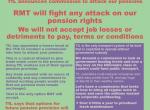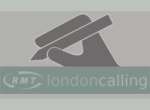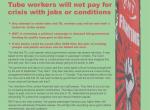Similar topics:
Our Executive Member for London Transport - Janine Booth, gave a report to the Women's Committee of the European Transport federation in helsinki, in September 2013.
Violence against women
This is one of the ETF Women’s Committee’s priority issues for the next four-year period. The Committee plans to: collect examples of workplace ‘good practice’ from affiliates and develop from these a template policy. I argued that we should also include examples of bad practice, and provide a platform for women transport workers to speak out about violence and abuse and the poor responses from employers. This point was accepted.
RMT should send to the ETF Women’s Committee all our policies, employers’ policies and other materials on the issue of violence to contribute to this work.
ETF Women’s Committee’s work will highlight the impact of austerity measures on levels of violence eg. increase in anti-social hours; lone working; job insecurity; lack of money and social benefits.
A Committee member pointed out that there is a problem with women transport workers accepting verbal abuse etc as ‘just part of the job’, and only seeing rape or beating as ‘violence’. I suggested a poster for workplaces on the theme of ‘Violence and abuse against women transport workers - it’s not part of the job’. There was a positive response to this, and we will develop ideas at the working group (see below).
25 November is the annual United Nations day of action against violence against women. The International Transport workers’ Federation (ITF) supports this and produces campaigning materials. ITF has sent information to all affiliates. I would urge RMT regional women’s networks to organise activities on this day. The national union should:
order materials from the ITF and distribute them to NWAC members and others who are organising action
announce on this date which employers are working with us to adopt a policy on domestic violence and which have refused: give the employers advance notice of our intention to do so
ensure that in future years, the ITF’s mailing about this annual event is placed in front of the Council of Executives and the National Women’s Advisory Committee at the first opportunity after it is received
publish an article in RMT News after the day of action reporting on campaigning actions and issues.
A working group of three has been set up to coordinate the ETF Women’s Committee’s work on the issue of violence: myself, Ekaterina (Bulgaria) and Brigitta (Netherlands).
Women’s Health and Safety
The second priority campaigning issue for the ETF Women’s Committee is women’s health and safety at work. There is a particular concern that in the transport industry, women’s health and safety issues are overlooked because women are less likely to work in jobs with obvious physical dangers.
Workplace stress and bullying has been identified as a serious health and safety risk to women in transport industries.
One key area of work for the ETF Women’s Committee will be to develop a module on Women’s Health and Safety at Work to add to its training package.
A working group of three has been set up to coordinate the ETF Women’s Committee’s work on the issue of women’s health and safety at work.
RMT should ask our National Women’s Advisory Committee what issues and activities it wishes the union to include in this area of work.
Women’s participation in trade unions
The Committee continues to prioritise encouraging greater participation of women in ETF-affiliated trade unions.
To help improve participation, the Committee has developed a training package, which is designed to be flexible enough to be used in a variety of settings, including informal groups as well as formal training courses.
RMT should look at how we can use this training material.
Levels of women’s participation vary between different affiliated trade unions. Some have used effective strategies to increase women’s participation. ETF Women’s Committee is compiling information on this.
RMT should consider this information when it is available and ask women members’ views on whether we should take up any of these strategies.
Our proposal for multi-lingual ‘A Woman’s Place Is In Her Union’ materials has received a positive response, with the ETF Secretariat reporting that it should be possible to produce this.
Country visits
ETF Women’s Committee facilitates visits of members to countries when a host union extends an invitation.
RMT should invite FTTUB (Bulgaria) and perhaps other Eastern European unions to visit the UK in January 2014 to assist with welcoming and organising Eastern European migrant workers in vulnerable employment.
Austerity cuts
ETF Women’s Committee is working with other sections of the ETF to conduct an indepth analysis of the impact on the economic crisis on women transport workers in Europe.
ETF LGBT Committee
RMT will be proposing to the ETF (and the ITF) that it set up an LGBT Committee along the same lines as the Women’s Committee. I reported this to the meeting and urged the women’s representatives on the ETF Executive to support it.
Women (and men) transport workers in Finland
We had an in-depth discussion and exchange of information and views with Finnish trade unionists. I have posted a detailed report of this separately. It is available here: http://www.rmtlondoncalling.org.uk/node/4478
Driverless Metro
I had an informal discussion with Finnish trade unions about the Helsinki Metro’s plans to go driverless in 2016. There are important lessons for RMT in fighting driverless operation on London Underground (and other Metros).
I have written a detailed report, which you can read here: http://www.rmtlondoncalling.org.uk/node/4472
- 5453 reads





